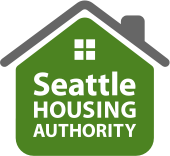SEATTLE – July 11, 2012 – After a public process lasting nearly two year, all residents who lease from Seattle Housing Authority are prohibited from smoking cigarettes inside their homes. The new policy was passed by the Board of Commissioners in November 2011 and was implemented on February 1, 2012. As of April 1, residents will be cited for a lease violation if they smoke in Seattle Housing Authority buildings.
The agency was assisted in the process of going smoke free by a $150,000 two-year grant from Public Health – Seattle & King County. The grant allowed for the hiring of Thai Nguyen, who worked closely with residents throughout the process to understand their issues and assist them in adjusting to the change. Cessation support was a key ingredient of the assistance.
Executive Director Tom Tierney issued the following statement regarding the change in policy:
Recognizing that cigarette-smokers have no "right" to smoke in their apartment units under HUD, Fair Housing, or ADA regulations, Seattle Housing Authority has been working for a number of years to try to protect non-smokers and our employees and their rights to breathe smoke-free air.
We began in 2003 by making smoke-free our 86-unit Tri-Court public housing complex. We followed that in 2005-2009 by adding 60 units of smoke-free "Breathe-Easy" apartment homes at High Point. In 2010 we prohibited smoking in the units of our 1,000-unit Senior Housing portfolio, and in April 2012 we have implemented a no-smoking policy in all the units we own and manage.
We were bolstered along the way by surveys of residents that showed a majority of both smokers and non-smokers prefer freedom from second-hand smoke within their apartments. We have also been gratified by post-implementation surveys which show that 72 percent of respondents smell smoke "less often" since the implementation of the new policies, and that 74 percent approve of the new policies. Even better, 25 percent of smokers report they are smoking less because of the new policies and 16 percent say they quit smoking because of the policies.
We expect to achieve a side-benefit of lower maintenance costs and reduced risk of fires from this policy, but primarily we believe it’s a matter of social justice: to protect the right to clean air for everyone living and working in our buildings.
